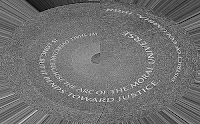Emmanuel, Emmanuel,
His name is called Emmanuel.
God with us, revealed in us,
His name is called Emmanuel
I have sung this simple song in church countless times since
it came out in 1976. It was written that year by Robert McGee, who at the time
was an associate pastor at The King's Temple Church in Seattle, Washington.
It is used in churches of various theological persuasions, but
I wonder if people pause to consider the theological message of the words. The
author is clearly referring to the prophecy mentioned in Christmas story of the
Gospel of Matthew. What is unique about this song is the author’s
interpretation of the name Emmanuel.
Everyone agrees that it means “God with us,” but McGee takes
it a step further. He says that it also means “God revealed in us.” It is one
thing to say that God is revealed in Jesus Christ. It is another to say that
God is revealed in you and me. This revolutionary part of the song often goes
unnoticed.
Emmanuel is more than a prophecy fulfilled in Jesus or a theological
statement about Jesus. It is saying that the God who was in Jesus is also
revealed in people singing about Jesus.
God is revealed in us. Think about that for a moment.
How is God revealed in us? No qualifications are mentioned
in the song. It does not say that God is only revealed in Christians who
believe a certain set of doctrines or attend a certain type of church. It does
not say that God is revealed in certain rituals, words or actions. It simply
says that God is “revealed in us.” Unconditionally, it would seem.
This is another way of expressing the idea of Imago Dei -
that all people are made in the image of God. When we see a human, we are
seeing the face of God.
There is another song often sung this time of year entitled
“Mary, Did You Know?” The lyrics were written by Mark Lowry in 1984 and set to
music by Buddy Greene in 1991. The song wonders what was in the heart and mind
of Mary on the day Jesus was born. One of the stanzas says:
“Mary, did you know
That … when you kiss your little baby
You kissed the face of God?”
“Did you know
That … this sleeping child you're holding
Is the Great I Am?
In India people greet each other by folding their hands as if in prayer and bowing to each other. It is usually accompanied with the word “Namaste,” which (according to the Hindu American Foundation) literally means, “The Divine within me bows to the same Divine within you.” It is a way of acknowledging the presence of God in the other person. That is Emmanuel. God with us, revealed in us.
I do not know what was in the mind or heart of Robert McGee when he was inspired to write the lyrics to Emmanuel. But like all poetry the meaning of verse is more than the intent of the author. It is equally in the heart of the hearer. To this hearer Emmanuel is an invitation to see God in the other and in the depths of our own hearts. As the beautiful Christmas carol “O Little Town of Bethlehem” puts it:
O holy Child of Bethlehem,
descend to us, we pray;
cast out our sin and enter in;
be born in us today.
We hear the Christmas angels,
the great glad tidings tell;
O come to us, abide with us,
our Lord Emmanuel!


















